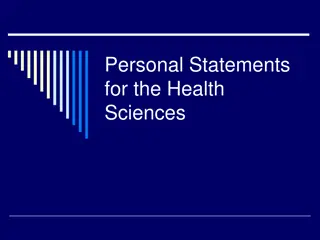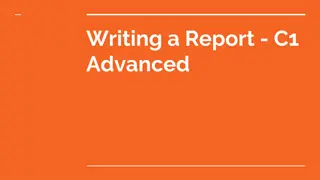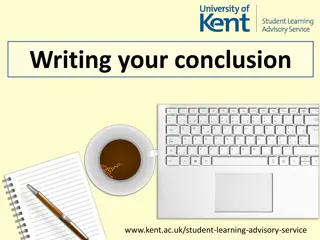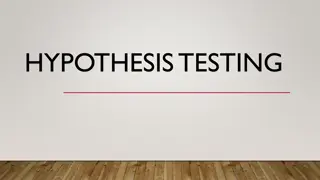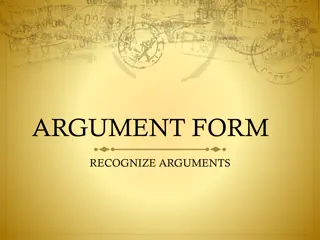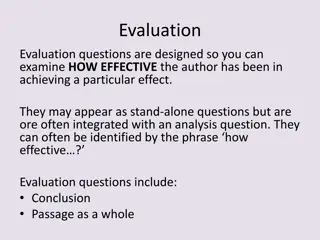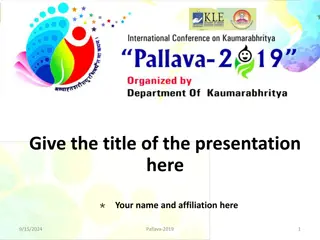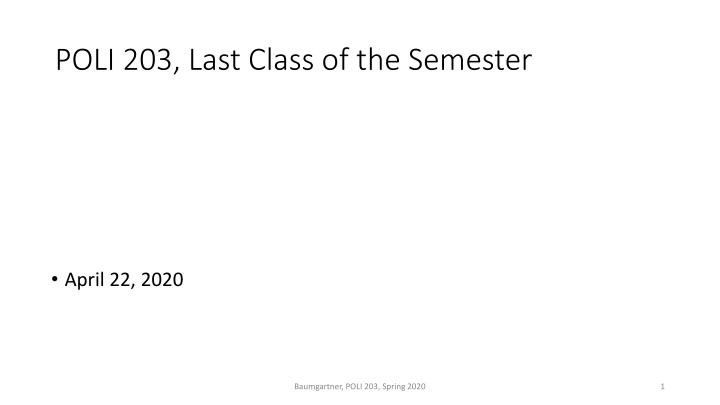
The Reality of Death Penalty System in POLI 203 Course
Dive into the intricacies of the death penalty system as explored in Baumgartner's POLI 203 course. Analyze the flaws, biases, and inefficiencies that persist despite mandated safeguards. Gain insights into recent legal developments and media portrayals related to innocence and the death penalty.
Download Presentation

Please find below an Image/Link to download the presentation.
The content on the website is provided AS IS for your information and personal use only. It may not be sold, licensed, or shared on other websites without obtaining consent from the author. If you encounter any issues during the download, it is possible that the publisher has removed the file from their server.
You are allowed to download the files provided on this website for personal or commercial use, subject to the condition that they are used lawfully. All files are the property of their respective owners.
The content on the website is provided AS IS for your information and personal use only. It may not be sold, licensed, or shared on other websites without obtaining consent from the author.
E N D
Presentation Transcript
POLI 203, Last Class of the Semester April 22, 2020 Baumgartner, POLI 203, Spring 2020 1
Announcements and reminders Do your quiz for this week, available at 11am on Wed and due late Friday night. Make sure you complete your extra forum posts, also due Friday. Next Monday, April 27, Part A of the final will be available, which is 5 ten-question quizzes. Make sure you complete all five of these before the exam time, 3pm on Tuesday May 5. The following Monday, May 4, Part C of the final will be available, requiring a response through Sakai. Make sure you do that also before 3pm on Tuesday May 5. Remember, you do not get smarter on a minute-by-minute basis, so there is no reason to procrastinate, and some danger (you could lose your wifi connection, or whatever). So, do it early. Take advantage of these wide time-windows I ve given you. Baumgartner, POLI 203, Spring 2020 2
Announcements (cont) Please do your course evaluations; those will be available soon. I added some questions specific to this class to get your feedback on particular things: the readings, the speakers, the guest lecturers; feel free to give feedback about anything including items I did not discuss in class, but should. I ll teach this class again in Spring 2022. Baumgartner, POLI 203, Spring 2020 3
Other reminders Lots of innocence- and death-penalty related stuff in the media these days: Netflix series: The Innocence Files, 9 episodes, some names and places you will recognize from class. New film: Clemency (Of course, Just Mercy ; see also HBO documentary, True Justice: Bryan Stevenson's Fight for Equality (2019): https://youtu.be/JfZPl4CFEUc ) US Supreme Court just ruled that Oregon and Louisiana s 10-2 jury verdict rules (e.g., non-unanimous juries) are unconstitutional. Very big decision. Justices Gorsuch and Kavanaugh were on the liberal side, and Gorsuch wrote the opinion. Thomas even agreed. So this was very big. The case is Ramos v. Louisiana; google it to read the decision or news coverage of it. Baumgartner, POLI 203, Spring 2020 4
How to summarize this entire course? We try to do this in the last chapter of Deadly Justice. The entire premise: Does the new and improved death penalty system, with all the procedural safeguards that were mandated by the Court in Furman, and ratified in Gregg, achieve its goal? What is the goal? Fair and impartial justice, free from the flaws that were enumerated in Furman (1972) The answer is clear: no, no, and no. Same flaws that were there in Furman are still there: capricious, arbitrary, racially biased, gendered, etc. Failure of proportionality review, no narrow targeting in most states. Garden-variety robberies are eligible New flaws: no deterrence, perhaps even more capricious since geography matters so much now, high cost, recognition of innocence of many inmates, extreme delays on death row, governors no longer give clemency, torture elements of last-minute stays, lethal injection and other botches. Baumgartner, POLI 203, Spring 2020 5
But what should you have actually learned? Homicides are way too frequent. By definition, those charged with solving them have to put them in different classes or categories: Capital v. not; 1st degree, second degree, etc. Lots of that is based on the intent or mental state of the killer (mens rea). That should really give you pause. How the justice system makes the decision of the original jury so important, and how hard it is to fix it if the jury errs. (Willie Grimes case, for example) How important it is to evaluate the actual workings, not just the theoretical design, of the justice system. (That applies to all systems, btw.) How results and changes come from the advocacy efforts of people involved on both sides: Tough-on-crime, or civil rights. Nothing happens automatically. The struggle for policy outcomes is the essence of democracy. Baumgartner, POLI 203, Spring 2020 6
How to study? (What you really want to know ) Review the lecture slides and the readings. Review the quizzes, available on the class web site. Remember the quiz from the first day of class: basic facts. I do believe that numbers matter. So you need to know the general, rough estimates, of some numbers. How many homicides, death sentences, executions are there per year, for example? US and NC. Anyway, yes, you need to know numbers if they are important to understanding the topic: what percent are overturned, how long are delays, what percent of lethal injection cases saw low levels of tranquilizing drugs. Stuff like that. Each chapter in the book probably has a few numbers you should know. Baumgartner, POLI 203, Spring 2020 7
Why do I care about numbers? I don t care if you know that the rate of reversal is 68% or 72%. However, it is important to know that it is in that ballbark. So any quiz that asks you about numbers will give options that only require that you pick the closest ones, and unlike the proper way to do an eyewitness ID lineup in a police department the options will NOT be similar. The numbers indicate some basic themes: low rates of use, geographical concentration, racial bias (particularly by race of victim), and so on. Baumgartner, POLI 203, Spring 2020 8
Supreme Court cases and the Bill of Rights. Yes, you need to know that cruel and unusual comes from the 8th Amendment, that due process is guaranteed under the 14th, and so on. Yes, you need to know that it was Roper v. Simmons that eliminated the death penalty for children under age 18. I can t have you go get a job or get into law school and say: Yes, I had this class with Baumgartner and I studied the death penalty, but I don t recognize the Furman v. Georgia case. Obviously, you ll want to know exactly which things you need to know. Sorry, the more the better! Certainly on the quiz there will be nothing that has not been emphasized, usually several times, in the readings and lecture. So there will be no surprises. Baumgartner, POLI 203, Spring 2020 9
Legal terminology Yes, there is some specific terminology associated with this course, and sometimes it can be confusing. Examples: Direct appeals, habeas appeals, Motion for Appropriate Relief (MAR), pardon, exoneration, commutation, clemency, death warrant Again, the more you understand the precise meanings of these terms, the better. The exam will have a bunch of them, but none again that were not emphasized in class or seen many times in the readings. TIP: knowing vocabulary, facts, constitutional provisions, and other things we have studied in this class is generally helpful. Baumgartner, POLI 203, Spring 2020 10
Individual cases You should review your notes from the speakers events, and the guest speakers who came to class. If you missed a speakers event, you still need to get the notes. Willie Grimes and the Innocence Inquiry Commission: Yes, you read a whole book about that, so read it again! (No, there will be no questions about the additional books on which you wrote your second papers.) Baumgartner, POLI 203, Spring 2020 11
General advice Lots of the exam is made up of the 5 quizzes, and these will be similar in format and content to the six quizzes you have been taking over the past six weeks. In fact, some of the questions may overlap (but note the answer choices may not be the same). Read questions carefully. I write books. I think that words matter. So pay careful attention to the words. Note that the other parts of the final exam will be graded on this basis: Full credit if you engage with the material and comply with the length requirements. Zero credit if you do not. I promise, if you take it seriously, engage, and don t try to be a trickster, you ll get full credit. No credit will be for people who either have no idea how to answer the question or for those who chose to write just a few words, suggesting a lack of engagement. So Parts B and C of the exam will not be hard. Baumgartner, POLI 203, Spring 2020 12
How to study? Go over the quizzes Re-read the two books Go over the lectures Re-read your own term papers Do the quizzes one at a time during a time when you can give it your full attention. Take a break and do another one. There are only 50 questions altogether, so it s not a marathon. And you have plenty of time to do it. Please do not wait until the very last second because inevitably something will happen and you ll miss the deadline. Why push it? Baumgartner, POLI 203, Spring 2020 13
Why I teach this class to such a big group I never have been a professor who liked to teach a big lecture. My first Dept Head made me teach Intro to Comparative Government back in 1986 (at the University of Iowa!). That was the first and last time I taught a lecture-style class until this class went big in Spring 2013. So, for 25 years I always avoided big lectures. Fall 2010: I taught this as a new experimental class to 30 students. 2013: 90 students; 2014, POLI 203 in the course catalogue, 180 students; 2016, 2018, 2020 enrollments went to 240, 270, and now 400. As far as I know, it s as big as it can get now, in the largest lecture hall on campus. (And, after Covid, who knows if the university will have classes this big in the future ) Baumgartner, POLI 203, Spring 2020 14
The speakers and the material can change your life Hopefully, you ve gotten the idea that this class is not like other classes. The material is hard to stomach. The factual material is one thing, and my book and a lot of my own research focuses on that. But the human stories are what drive things. It should give you a feel for life, strength, honor, beauty, all those things. In addition, it should introduce you to some professionals who work in the system and try to improve it. Baumgartner, POLI 203, Spring 2020 15
Hopefully, these examples will matter to you You can see through so many examples in this class that: The world is far from perfect. The causes of the problems are complex. Many dedicated people are working to improve the system. Also, it should be clear that: Dontae Sharp, Jimmy Dennis, Kristine Bunch, and David Boyce have a lot more to complain about that you do! So, it puts things in perspective. They survived with grace and grandeur, and so can you. Baumgartner, POLI 203, Spring 2020 16
Please do something with this class One thing I want everyone to recognize is that passion is important. But passion is not enough. You also need skills, training, education, and good work habits. With a combination of a passion to do something important, and the skills to do a good job of it, every one of you can make a difference. There are hundreds of fantastic career paths in so many professions where you can make a difference. Please make sure that when you are my age you don t wonder how you wasted all the gifts you have. Do something so that your work IS your passion, and your passion is to fix some small part of the world. Baumgartner, POLI 203, Spring 2020 17
Thank you to our TAs and Graders I know that much of the experience you have had in this class is because of your TA. I have been very impressed with their dedication to the material. None started out the semester an expert on this topic. But I hope you agree with me that they have done a great job. We also benefit from the help of two graders, Colin Case and Begum Icelliler, who are also working behind the scenes to make sure our assessments and grades are accurately recorded. Thanks to all of you! Baumgartner, POLI 203, Spring 2020 18
Stay in touch with me, please. I was awarded a competitive fellowship so I have a research leave in Fall 2020 (Hooray for me! I can write another book.) But I ll be teaching again in Spring 2021 and the following year. Look for me in the course catalogue and see if you can get in my class. I also have lots of research projects where I often involve students. And, my email always works and I ll look forward to hearing from you even after you graduate. Baumgartner, POLI 203, Spring 2020 19
So long for now Good luck on the final work for the semester. Good luck with your other classes. I hope to see you again Thanks for taking POLI 203. I hope it was a good experience for you! Baumgartner, POLI 203, Spring 2020 20

